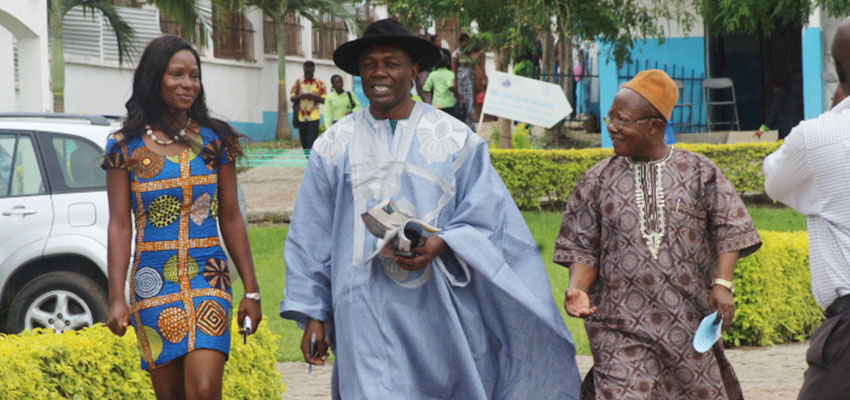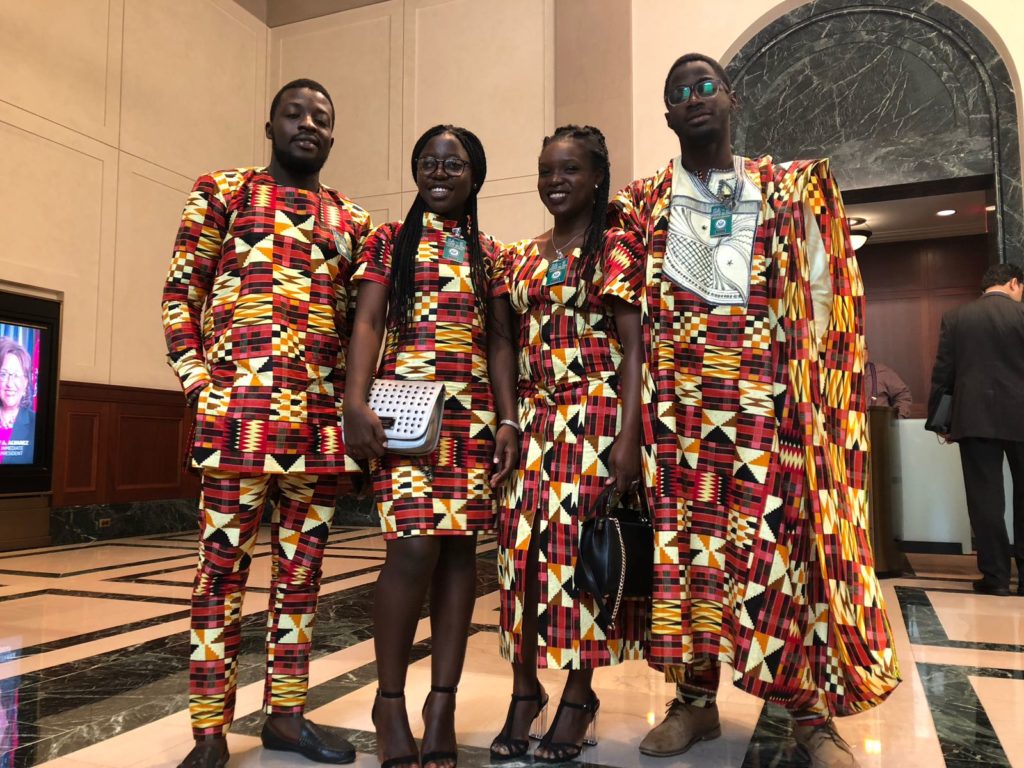CUIB’S AFRO-AMERICAN MODEL OF EDUCATION
CUIB provides a university education that is truly unique in the world as it embraces two systems into one, namely the Afro-American university model. It aims at infusing the African traditional education with that of modern America (USA). This system involves learning by doing, that is, combining theory with practice under a spiritual and moral foundation. Let us briefly look at each of them closely:
CUIB’S AFRICAN TRADITIONAL EDUCATION SYSTEM

CUIB as a Catholic university is modeled and developed as an African or Afro or African-centred University system prior to the slave trade and the colonial period as articulated in the works of many African-centered educators and thinkers. ( see Asante, 1988; Cheikh Anta Diop, 1979; Karenga, 1990; Mbiti, 1970; Nobles, 1980; Austin, 1984; DuBois, 1969; Griaule, 1972; Temple, 1976; Diop, Saad, 1983, Obenga, 1992; Asa G. Hilliard, III 1998; Nkeze Jingwa, Rome, 2007). Examples abound of great African universities prior to slavery at Timbuktu, Jenne, and Gao in the Niger River Valley in West Africa. (See Austin, 1984; DuBois, 1969; Saad, 1983; Temple, 1976). These had many cultural similarities to those in “Ethiopia”, Somalia, Sudan, Nubia and Egypt of the Nile River Valley.(See Budge, 1928; Diop, 1991; Hilliard, 1989, 1986, 1985; Obenga, 1992, 1995). These universities developed an educational system based on the African world view that held sacred the belief in human perfectibility, the belief that humans could indeed become more like God. Basic skills were merely the lowest level of education and methods of education emphasized the tutorial, apprenticeship and social learning. The development of character, humanity and spirituality were higher levels of attainment.
The Purpose of University education in this world view was to help students become more like God. Thus, they produced an educational system that had to be directed at the mind, the body and the spirit – inseparable parts of our human, individual and community whole. The African traditional world view did not emphasize individuals. The individual was part of a group, a collective. The ideal for both individuals and the group was to become Godlike, specifically in adhering to the principles of truth, justice, order, reciprocity, harmony, communion and balance (Obenga, 1995; Hilliard, 1989). Three values and ethos had pride of place in these Universities – Concern for the everlasting, for the continuity of the African culture, and for the Divine imperative. These values are also key in CUIB’s Afro, African, or African-centered model of Education. In CUIB education is meant to feed the soul of the student with what endures. While the most popular language of talking about the curriculum that drives Anglo-Saxon universities and universities modeled on the Anglo-Saxon system direct attention to a tripartite division of “cognitive”, “affective” and “psychomotor” objectives, or mind, emotions and body, CUIB, like traditional African universities before slavery includes the soul and sets education for the soul at the pinnacle of the education process. Mind, emotions, and body education/socialization must be linked to spiritual aims, a fourth level. This is what in CUIB we call “Education for Eternity.”(See CUIB President Nkeze’s Vision 2022). While thinking in Anglo-Saxon universities has led to the de- spiritualization of the world, traditional African Educational systems strongly observe that human beings have souls. Mbiti (1970) argues that secularity has no reality in the African experience. None perhaps has expressed this point better than he:
“Wherever the African is, there is his religion: he carries it to the fields where he is sowing seeds or harvesting a new crop; he takes it with him to the beer party or to attend a funeral ceremony; and if he is educated, he takes religion with him to the examination room, at school or in the university; if he is a politician he takes it to the house of parliament. Although many African languages do not have a word for religion as such, it nevertheless accompanies the individual from long before his birth to long after his physical death” (Mbiti, 1970, pp.2-3).
High values therefore for the African are reflected in the concern for the everlasting, for the continuity of the culture, and for the divine imperative. Accordingly, Education for eternity in CUIB is reflected in our concern for the everlasting, for the continuity of the CUIB culture, and for the Divine imperative that fosters a learning that endures. In an age where information is critical for human flourishing, CUIB has developed ways to create a distinctive academic experience for its students. This can only be possible when we consider learning as Divine since it emphasizes the spiritual growth, transformation or inspiration of the student. The vision of the Lecturer or Coach in CUIB is one of a selfless healer intent on inspiring, transforming, and propelling students to a higher spiritual level. The role of the lecturer or Coach in this system is to help the student to be the best version of who he or she is in the divine plan. Learning is about coming into being, a creation. A student reflects, becomes and creates. It is a process of human transformation – a process of becoming more like the divine. This is what make our students true Job creators.
As CUIB is intended to be an institution that will last into perpetuity, learning and teaching is linked to eternity. Lecturers or Coaches who are hired to work in CUIB are trained to touch the spirit of their students. True education for eternity begins when the Lecturer or Coach “touches the spirit” of the student and opens up the passion for knowledge and inspires the student to love learning. This is what in CUIB is called the “Divine Dance” – where learning is perceived and lived as a joyful and fulfilling experience. This is why CUIB is unique as it has developed a systematic practice and culture of inspiring greatness. This culture begins as the student seeks admission into CUIB. Our focus in CUIB is to help students pursue their dreams and their passion unlike other universities where the emphasis is on the number of points that a student obtains at the Advanced Level. What has pervaded our country Cameroon and kept it complacent today are the lack of ethical standards and the practice of ethics in daily life. In all sectors, at all levels including academia, people are constantly practicing dishonesty, embezzlement, blackmail and a host of “soulless” practices. Our society needs a soul culture. This is what Afro, or African or Africa-centred education is all about as lived and fostered in CUIB, the entrepreneurial University.
CUIB’S USA SYSTEM OF EDUCATION
CUIB’s educational model also seeks to reflect the current United States of America (USA) experiential university system in terms of governance, management style, curriculum, grading, university structure and aspiration. This model was greatly influenced by the American Philosopher, psychologist, and educational reformer John Dewey (See Dewey, Democracy and education, 1916; Dewey, Experience and education, 1938; Dewey, How we think, 1910). John Dewey (1859-1952) believed that learning was active and schooling unnecessarily long and restrictive. His idea was that children came to school to do things and live in a community which gave them real, guided experiences which fostered their capacity to contribute to society. For example, Dewey believed that students should be involved in real-life tasks and challenges: math, for instance could be learnt via learning proportions in cooking or figuring out how long it would take to get from one place to another by mule; history could be learnt by experiencing how people lived; geography, what the climate was like, and how plants and animals grew. Dewey had a gift for suggesting activities that captured the center of what his classes were studying. John Dewey is known today as the Modern Father of Experiential education and the current USA Educational model which CUIB has adopted is based on this Philosophy.
CONCLUSION
What a good mix to have soul education (Africa) and experiential and hands-on education (US) brought to one. This unique blend of two systems is perfectly in line with CUIB’s mission, identity and character to train job creators versus job seekers with spiritual and moral values who will contribute to the sustainable development of their communities. It is also in line with CUIB’s entrepreneurial philosophy which focuses on the Heart and Soul of Entrepreneurship. In CUIB the heart refers to the “techne”, that is the skills that the students have to acquire in a particular discipline. The needed skills within business for instance of reading a balance sheet, calculating cost of capital, providing statistical analysis, targeting and segmenting markets, managing group dynamics, generating creative thinking, mediating conflicts, and so forth are imperative. Such skills provide the Matter or Heart of Business competence which true entrepreneurs need to change the world. However, this is not enough. In CUIB, we also emphasize the Soul of business or entrepreneurship. Entrepreneurship has a SOUL, which is the character, the ethics, the integrality of the entrepreneur. Without this aspect, CUIB will be training crooked accountants. Accordingly, the Heart and Soul of entrepreneurship is central to who we are as a Catholic entrepreneurial institution. This is what makes CUIB’s entrepreneurial philosophy unique in the world as it brings two rich educational cultures and systems to a unity. Hence our motto: Sancti et scholari (Saints and Scholars).

ALUMNI STATISTICS

CONTACT
Catholic University
Institute of Buea
563 Buea
Litoral Region
Cameroon
Landline: 653 87 37 07
Email: directorate.douala@cuib-cameroon.net